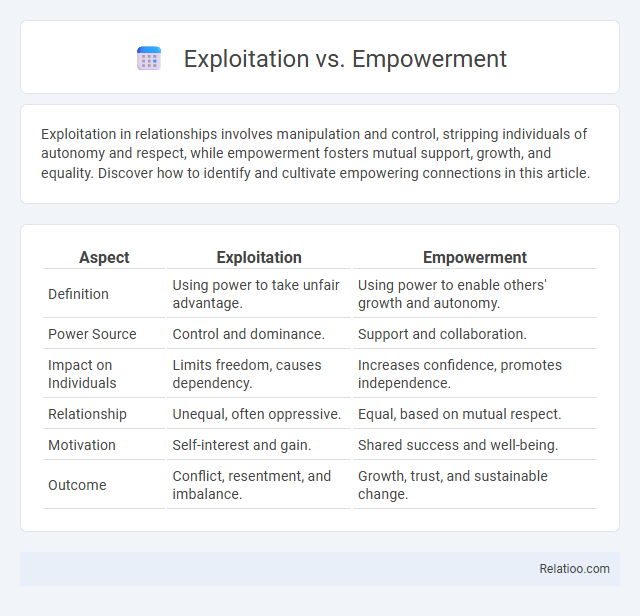Exploitation in relationships involves manipulation and control, stripping individuals of autonomy and respect, while empowerment fosters mutual support, growth, and equality. Discover how to identify and cultivate empowering connections in this article.
Table of Comparison
| Aspect | Exploitation | Empowerment |
|---|---|---|
| Definition | Using power to take unfair advantage. | Using power to enable others' growth and autonomy. |
| Power Source | Control and dominance. | Support and collaboration. |
| Impact on Individuals | Limits freedom, causes dependency. | Increases confidence, promotes independence. |
| Relationship | Unequal, often oppressive. | Equal, based on mutual respect. |
| Motivation | Self-interest and gain. | Shared success and well-being. |
| Outcome | Conflict, resentment, and imbalance. | Growth, trust, and sustainable change. |
Defining Exploitation and Empowerment
Exploitation occurs when individuals or groups are unfairly used or manipulated, often for economic or social gain, stripping away their autonomy and rights. Empowerment involves granting You control, confidence, and resources to influence Your own life and environment positively. Understanding these concepts is crucial to addressing social inequalities and fostering environments where empowerment can replace exploitation.
Historical Context of Exploitation
Historical context of exploitation reveals systemic practices where dominant powers extracted resources and labor from marginalized groups, often under colonial regimes or oppressive economic systems. This exploitation entrenched social and economic inequalities, limiting access to education, wealth, and political rights for oppressed populations. Understanding these historical patterns is essential to addressing the ongoing disparities and fostering empowerment that counters cycles of despair.
The Evolution of Empowerment
The evolution of empowerment reflects a transformative shift from exploitation and despair towards increased autonomy, agency, and resilience among marginalized groups. Empowerment fosters self-efficacy by providing access to resources, education, and supportive networks, enabling individuals to overcome systemic barriers. This progression is evident in social movements, workplace reforms, and community development initiatives that prioritize participatory decision-making and inclusive growth.
Key Differences Between Exploitation and Empowerment
Exploitation involves taking unfair advantage of others for personal gain, often leading to feelings of helplessness and loss of control, whereas empowerment centers on providing individuals with the resources, support, and confidence to make autonomous decisions and improve their own lives. The key difference lies in the purpose and outcome: exploitation diminishes autonomy and well-being, while empowerment enhances your ability to influence positive change. Understanding this distinction is crucial for fostering environments that promote equity and personal growth rather than oppression.
Signs of Exploitation in Modern Society
Signs of exploitation in modern society include systemic inequality, where marginalized groups face limited access to resources and opportunities, and workplace abuses such as unfair wages and unsafe conditions. You may observe exploitation through the prevalence of human trafficking, labor exploitation in gig economies, and discriminatory practices in hiring or housing. Recognizing these signs is crucial for fostering empowerment and addressing despair within affected communities.
Strategies for Achieving Empowerment
Strategies for achieving empowerment involve fostering resilience through education, skill development, and access to resources that enable informed decision-making. Your involvement in building supportive communities and advocating for equitable opportunities reinforces self-efficacy and counters exploitation and despair. Emphasizing participatory approaches and collaborative leadership cultivates environments where individuals gain control over their lives and contribute meaningfully to societal progress.
Case Studies: Exploitation vs Empowerment
Case studies on exploitation vs empowerment reveal how marginalized communities experience contrasting outcomes based on external interventions. In exploited groups, such as those facing unfair labor practices in the Global South, case studies highlight patterns of resource depletion and social disenfranchisement. Empowerment-focused initiatives, like microfinance programs in Bangladesh, demonstrate measurable improvements in economic independence and community resilience, emphasizing the transformative potential of localized support systems.
The Role of Education in Empowerment
Education acts as a fundamental catalyst for empowerment by equipping individuals with critical skills, knowledge, and confidence to break free from exploitation and systemic oppression. Access to quality education fosters equal opportunities, enhances socioeconomic mobility, and encourages informed decision-making, transforming marginalized communities into active participants in their own development. Investment in inclusive educational frameworks directly combats despair by creating pathways toward self-sufficiency, resilience, and long-term well-being.
Navigating Power Dynamics: From Victim to Victor
Navigating power dynamics requires recognizing the fine line between exploitation, empowerment, and despair. Empowerment emerges when individuals reclaim control and agency, transforming from victims into victors by asserting their rights and capabilities. Overcoming exploitation demands strategic self-awareness and resilience to break cycles of oppression and foster sustainable personal growth.
Building a Culture of Empowerment
Building a culture of empowerment involves fostering an environment where individuals feel valued, supported, and motivated to take initiative, leading to increased productivity and innovation. This contrasts sharply with exploitation, where power imbalances suppress autonomy and breed resentment, and despair, which results from persistent disengagement and lack of opportunity. Emphasizing transparent communication, shared decision-making, and recognition cultivates resilience and engagement essential for sustainable organizational success.

Infographic: Exploitation vs Empowerment
 relatioo.com
relatioo.com